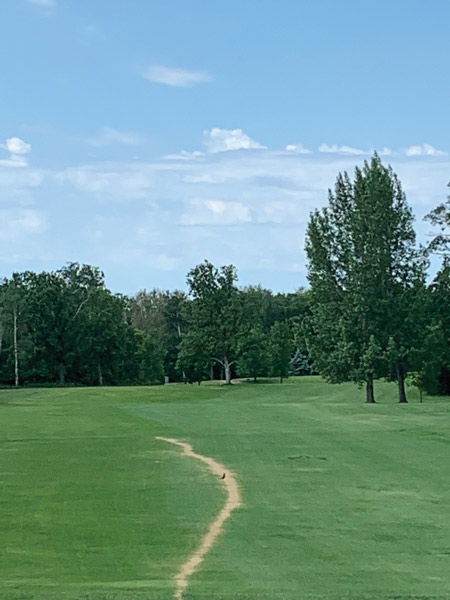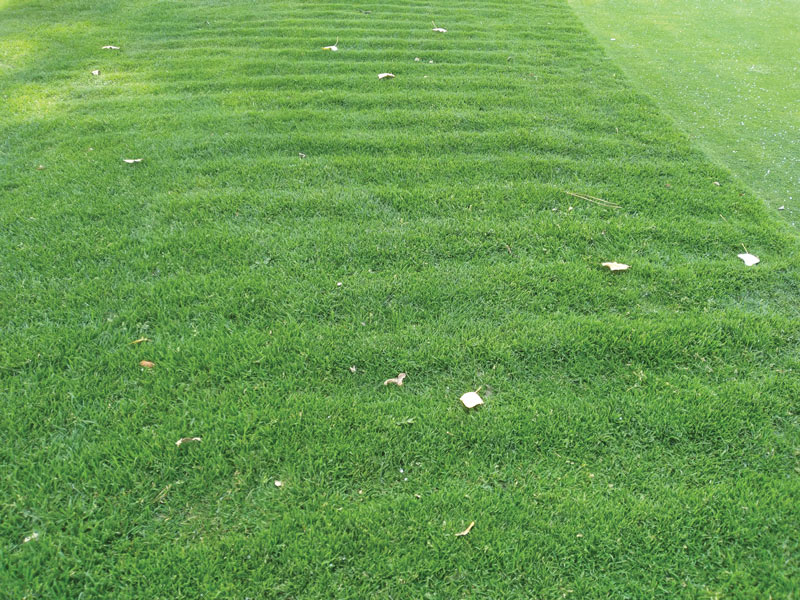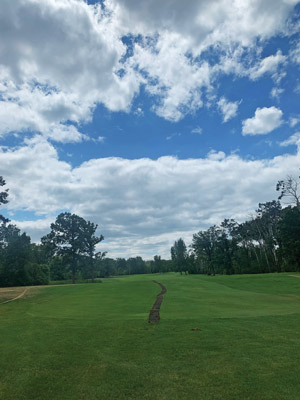GCM’s Photo Quiz is presented in partnership with STEC Equipment.

Problem A: Brown line on turf

Location: Carberry, Manitoba
Turfgrass area: Fairway
Turfgrass variety: Kentucky bluegrass and ryegrass mix
Problem B: Uneven turf with ridge tops 6 inches apart

Location: Condon, Ore.
Turfgrass area: Putting green collar
Turfgrass variety: Creeping bentgrass
Scroll down for answers.
Problem A: Brown line on turf

Last June, this superintendent borrowed a farmer’s spreader for the first time, and instead of a trial run on the range or another out-of-the-way corner of the golf course, he went right to the first fairway. He started driving down the fairway, looked behind him and saw the spreader belt moving, so he thought everything was fine. After driving a little farther, he realized the fertilizer wasn’t spreading; it was just dropping on the ground. As it turns out, the belt was moving, but the spreader’s impeller wasn’t turning.
The crew and superintendent cleaned it up the best they could, but, unfortunately, it left this burn mark. Because the mark was visible from the clubhouse, the crew rented a sod cutter and took some sod from the course’s massive driving range tee box and repaired the area.
Some golfers and board members joked that at least they wouldn’t have to mark up the turf with white spray paint for closest-to-the-line contests.
Photo submitted by Derek Samagalski, superintendent at Carberry Sandhills Golf & Country Club in Carberry, Manitoba.
Problem B: Uneven turf with ridge tops 6 inches apart
The superintendent at this course was baffled by what could have caused the uneven turf he found around several green collars, and he guessed the issue might be related to mowing speeds. The crew at this nine-hole municipal course is made up of a part-time superintendent and one seasonal employee who doubles as the mower operator. The uneven turf on the tops of these ridges is spaced out on the collar about 6 inches apart. It started at the ninth hole and seemed to be spreading in the order the collars were mowed.
Editor’s note: In his quest for uniform collars, a superintendent found some simple mowing adjustments could create consistent, eye-catching definition around greens. Read more in Turf hack: The perfect collar.
The culprit here was mowing too fast with the reel speeds too slow, which created a washboarding effect on the turf’s surface. Because the operator was mowing at the same speed and in the same direction each time, the effect became “burned in” and is almost permanent at this point. The spring remedy will be to use a rotary mower in the opposite direction and slowly lower the height down, so it won’t scalp too much. Over time, when the surface plane becomes smooth again, the staff will go back to the reel mower at the correct clipping rate.
Photo submitted by Gibb Wilkins, public works superintendent and golf course superintendent at Condon (Ore.) Municipal Golf Course.
Editor’s note: Have a photo of an on-course anomaly? GCM would love to have a look! Email it to Photo Quiz author John Mascaro.
John Mascaro is the president of Turf-Tec International.